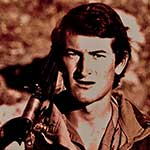|
David Mason
Late Welsh Guards
by Paul de Zulueta
formerly Welsh Guards

|
David Mason, who has died aged 73, was decorated for bravery for saving the lives of many of his comrades in a battle in the Dhofar War in 1975, having been seconded to the Sultan of Oman’s Army the previous year. The war in Dhofar, southern Oman, was being fought against communist insurgents backed by Russia and China.
On 6th January 1975, he was second-in-command of a company occupying a hill over open ground. Another company was crossing this ground when it came under heavy fire from an enemy force of about 200 strong. The company commander and many of the men were killed at once. There were calls on the radio for an immediate withdrawal, but Mason could see the extent of the casualties through the thorn trees and was sure that there were some wounded men among the dead.
Having ordered a capable lieutenant to take charge of the company, he ran forward across open ground under withering fire to look for possible survivors. He picked up one wounded man and carried him back to safety. Many were too severely injured to be moved but he did what he could for them.
Two soldiers with minor wounds helped him to defend the position against determined assaults at close quarters and relentless machine-gun and rifle fire. When the ammunition ran out, they resorted to hand-to-hand combat. Mason grabbed one of the attacker’s Kalashnikov and continued fighting with that.
After he was joined by soldiers from the SAS and the Sultan’s Army, they managed to carry all the wounded men to safety. Mason had been in continual action for three hours. He was awarded the Sultan’s Bravery Medal by the Sultan himself for his courage in saving the lives of 12 of his comrades at a critical point in the battle. Part of the medal citation read ‘many men owe you their lives for which you put your own at dreadful risk’. Mason rarely spoke of the action except to say, ‘It was a desperate time’.
David Peter Mason, the eldest of three children, was born in Oxford on 13th August 1951. His father, Michael, had served with Naval Intelligence in the Second World War. He was educated at Eton and joined the Army in 1969. He completed his initial training on the Brigade Squad at the Guards Depot, Pirbright, which he greatly enjoyed before attending officer training at Mons Officer Cadet School, which he found uninspiring.
In 1970, he was commissioned into the 1st Battalion Welsh Guards; there was no family connection, but he knew of their renown. The prospect of operational duty at the beginning of the Troubles in Northern Ireland also appealed to him. Ceremonial duties in London held little attraction and a skirmish with one of The Queen’s corgis which hurtled out of a side door of Buckingham Palace and fastened its teeth, did nothing to change his mind. His early career included three tours of duty in Northern Ireland, the first in Belfast under Major Charles Guthrie (later Field Marshal Lord Guthrie). Guthrie was to say of Mason: ‘I greatly respected him as a soldier, to some he was unnerving, I liked him enormously’.
He found peacetime soldiering dull after returning from Oman and after a tour in Berlin, where he was to meet his future wife, he left the Army. He joined Sir Ranulph Fiennes on the three-year Transglobe Expedition as part of the logistics team establishing and managing four base camps in the Arctic and Antarctica. In 1982, his father died and he came home to Oxfordshire to run the glorious Eynsham Park Estate which had been home to the family since 1866.
David Mason was conscientious in his responsibilities as a landowner and shrewd in decisions that would benefit the estate and local community. He was High Sheriff of Oxfordshire 1994-95 and appointed Deputy Lieutenant in 2004. He was County President of the Royal British Legion from 2006-2022. The members much looked forward to his annual address. 6 ft 4 tall, striking in appearance, with an unsettling gaze, he was never afraid to court controversy in taking on the faults of successive governments in their failure to live up to their duty of care to veterans and war widows.
Naturally curious and a man of wide learning, he wrote a highly acclaimed and international best-seller, Shadow over Babylon, published in 1992. The plot centred on a meticulously planned assassination attempt on Saddam Hussein after the Gulf War. It captured readers’ imaginations with its detailed research and vivid realism. His last years were marked by increasing deafness, the result of a Russian 120mm rocket exploding close to him in Oman. David Mason died on 15th March 2025. He married, in 1980, Monique Juranville, who survives him with their son and three daughters. |
|

